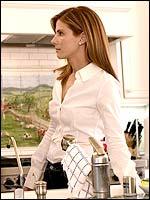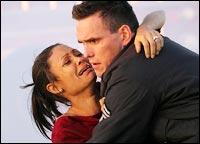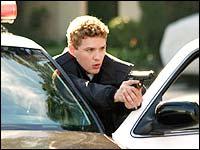 While in college, I once overhead a compelling conversation between a budding journalist and a Nigerian exchange student. The former insisted on asking the latter about racism in India. The student, quite understandably, looked uncomfortable. I wondered for a minute whether it was because it opened fresh wounds, or whether it was the interviewer's condescending line of questioning.
While in college, I once overhead a compelling conversation between a budding journalist and a Nigerian exchange student. The former insisted on asking the latter about racism in India. The student, quite understandably, looked uncomfortable. I wondered for a minute whether it was because it opened fresh wounds, or whether it was the interviewer's condescending line of questioning.
The problem with racism is that it exists and we go through elaborate self-deception to deny or appease it. Multiple Oscar nominee Crash, deftly written and directed by Paul Haggis, covers a lot of ground on the nature of racism, making a strong case that it exists in all of us.
The movie begins at the site of a car crash, where drivers from different racial backgrounds are playing the blame game. In the heat of the moment, one driver makes fun of the other's accent, which is when we realise this is more about a clash of cultures, rather than vehicles.
![]()
More on rediff.com!
![]()
![]()
![]()
![]()
In John's bedroom![]()
On the road with Neha Dhupia![]()
New directors: Lucky again?![]()
![]()
![]()
Crash tells many stories, one leading to another like hyperlinks on a Web site. But Haggis never wavers from his focus on racism. There is an Iranian who is a victim of racial attacks after 9/11, but he himself suspects a Hispanic locksmith for causing them. There is a white couple (Brendan Fraser and Sandra Bullock), victims of a carjack by a couple of African-Americans. The husband, a district attorney, doesn't want to make a big deal of the incident for fear of hurting his political career. The wife uses it to justify her racism.
Many such sub-plots go into creating an overall atmosphere of fear and distrust. Of these little stories, two stand out.
The first involves detective Graham (Don Cheadle) who cares for his ailing mother but gets no love in return. His mother's attention is focused on Graham's kid brother, who has developed bad habits and is missing. Graham finally finds his brother, but in a state he can't describe to a loving mother. Cheadle plays Graham as an intense loner with lot of depth and understanding.
 The second story involves Officer Ryan (Matt Dillon), who routinely uses his badge to practise racism on patrol. He stops an upper class couple (Terrence Howard and Thandie Newton) and does an inappropriate body search on the wife. His rookie partner Hanson (Ryan Phillipe) is disgusted by his behaviour and gets himself reassigned with another partner. As the story unfolds, we realise that Officer Ryan is not a bad person; just someone with low self-esteem. His father, suffering from prostrate cancer, can barely take care of himself. Ryan believes his gentle father is in this sorry state because of his failure in business. A failure caused by the government's affirmative action towards blacks. His racism is born out of this anger and need to get back at the system.
The second story involves Officer Ryan (Matt Dillon), who routinely uses his badge to practise racism on patrol. He stops an upper class couple (Terrence Howard and Thandie Newton) and does an inappropriate body search on the wife. His rookie partner Hanson (Ryan Phillipe) is disgusted by his behaviour and gets himself reassigned with another partner. As the story unfolds, we realise that Officer Ryan is not a bad person; just someone with low self-esteem. His father, suffering from prostrate cancer, can barely take care of himself. Ryan believes his gentle father is in this sorry state because of his failure in business. A failure caused by the government's affirmative action towards blacks. His racism is born out of this anger and need to get back at the system.
But Ryan faces his demons when he is called on to rescue a car crash victim who turns out to be the same woman he humiliated. There is a heartbreaking scene when she prefers death to rescue at his hands. This could well be the most heart-tugging cinematic moment of the year. Dillon, who deservers his Oscar nomination, displays a gamut of emotions -- ranging from regret to self-loathing -- that stays with you long after the movie is over.
 There are a great many moments of sad humour in the film, along with a lot more disturbing ones. Eventually, however, Crash is about an 'us-versus-them' mentality. About how people who don't look like us are condemned to be treated differently. If there is a flaw in the film, it is only that it hammers in this point without subtlety. Having said that though, I fail to see how the message could have been put across in any other way.
There are a great many moments of sad humour in the film, along with a lot more disturbing ones. Eventually, however, Crash is about an 'us-versus-them' mentality. About how people who don't look like us are condemned to be treated differently. If there is a flaw in the film, it is only that it hammers in this point without subtlety. Having said that though, I fail to see how the message could have been put across in any other way.
The stories are stringed together allegorically. There is no point searching for realism. But it works. There is an ensemble of big Hollywood names, but the script has the confidence to let them be true to their characters. Every actor makes you care about the characters portrayed.
Crash has been nominated for a clutch of awards, including Best Movie, Best Screenplay, Best Director, Best Editing and Best Supporting Role. The technical credits are top notch, especially the editing, as the stories move from one to the other. Highly recommended.





